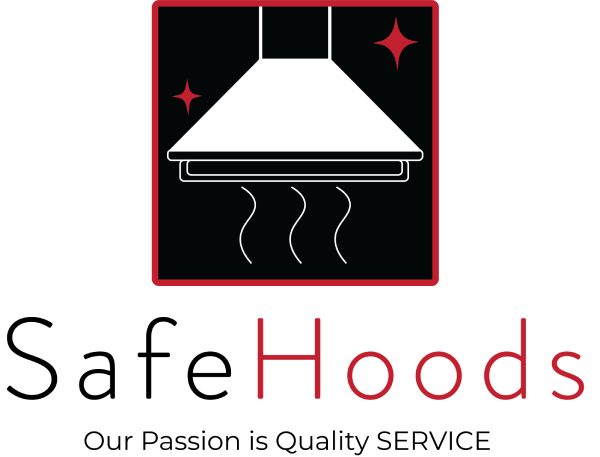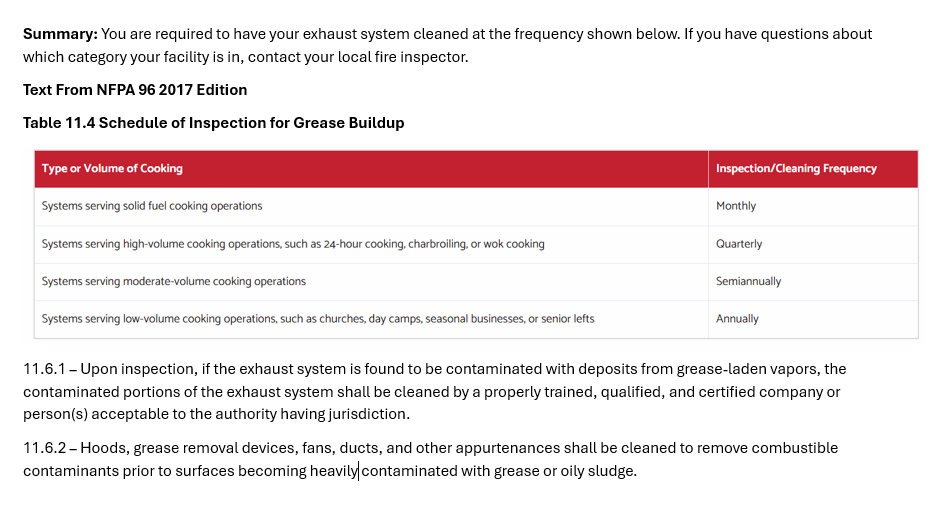FAQ's
Questions & Answers on Hood Cleaning
How do I get set up with SafeHoods for hood cleaning?
Call SafeHoods at 425-435-4444, use the form on the contact us page, or email us at info@SafeHoods.com. Be ready to answer the following questions:
- How many hoods and fans do you have?
- Where are the fans located, and do you have access?
- What appliances do you have under the hood(s)?
- When was your last hood cleaning?
How much does it cost to clean my hood(s)?
Each hood system is unique, and for that reason, our team will only be able to give you a price range over the phone. To determine the actual cost, an in-person visit is required. SafeHoods can sometimes give a range of cost with a phone call and description, but most times an on-site visit is required.
What does SafeHoods clean that is included in the cleaning fee?
SafeHoods cleans your entire hood system (hood, ductwork, and fan). Items that are not included are hood filters, kitchen appliances, and the kitchen floor behind and underneath the appliances.
How long will it take to clean my hood(s)?
Typical hood systems will take between 2 and 6 hours to clean. During your initial inspection, your SafeHoods team member will be able to give you a more accurate estimate of what you can expect for your cleaning.
Can I have my kitchen staff clean my hood?
It is good practice for your kitchen staff to routinely (2x/week) wipe down and clean the inside of the hood (without removing the filters), the filters themselves, the backsplash, appliances, and flooring under appliances. However, to be accepted by the Authority Having Jurisdiction (AHJ — typically the fire department and insurance company), the cleaning of the hood itself (hood, duct, and fan) must be done by a certified company and cleaning technicians.
Is SafeHoods a certified hood cleaner?
Yes
Does SafeHoods clean the filters as part of the hood cleaning service?
No
Do I have to sign a contract to have SafeHoods be my hood cleaner?
Yes, the SafeHoods quote/agreement is fairly simple. It defines the scope of work, frequency of cleaning, payment terms, job cancellation fees, and your responsibility—see NFPA Fire Code 4.1.5.
How often do i need my hood(s) cleaned?
Questions & Answers on Filter Exchange
How does the filter exchange program work?
SafeHoods owns/holds 2 sets of filters on your behalf that are exchanged (swapped out when dirty for 100% clean) at your location at an agreed-upon interval (typically every 2 weeks). See our Filter Exchange page for more details.
Why is it a big deal to keep my filters clean?
Your filters are the first line of defense for reducing/eliminating hood fires. Dirty filters increase your risk of hood fires, increase the smoke level in kitchens, and put unneeded strain on the fan and its motor. See our Filter Exchange page for more details.
Can I clean my own filters?
There is no rule that you can’t try to clean your own filters, but it is very difficult to keep filters 100% clean using only the cleaning methods/tools available in your kitchen, such as washing in a dishwasher or soaking/rinsing in sinks. These methods require consistently maintaining the cleaning cycle and often take away time that could be spent on other kitchen priorities.
How does SafeHoods get the filters so clean?
SafeHoods has a large constant temperature (200° F) soak tank with non-caustic chemicals that both clean and sanitize the filters. See the Filter Exchange page link for more details.
How do I sign up for the filter exchange program?
Call SafeHoods at 425-435-4444, use the form on the Contact Us page, or email us at info@safeHoods.com.
When I am in the filter exchange program, who owns the filters?
Typically, SafeHoods owns the filters. But, in some cases, for example, when specialty filters are needed, then other arrangements can be made.
How do I know if I have NFPA 96 compliant filters?
Look for the UL-listed stamp on the side of your filters.
Is there a cancellation fee to quit the filter exchange program?
No
Questions & Answers on Fan Services
My hood fan just stopped working—what do I do?
Make sure the fan switch and breaker are on. If that doesn’t fix the issue, then call SafeHoods emergency Fan Services at 425-435-4444.
Can we keep cooking if the hood fan is not working?
No, you should not cook or turn on appliances if the hood fan is not working.
My hood fan is on, but it just does not seem to be working well. Why?
The most common answer to this question is that the fan belt is loose for either your exhaust fan or make-up air.
Why does my hood fan breaker keep tripping?
The most common reason is that your motor is overheating/working too hard and over-amping, which causes the circuit breaker to trip. This usually means the motor needs to be replaced.
Why does my hood fan screech when it is first turned on?
This usually means your fan belt is loose and needs to be replaced or tightened.
Does SafeHoods clean the filters as part of the hood cleaning service?
No
Do I have to sign a contract to have SafeHoods be my hood cleaner?
Yes, the SafeHoods quote/agreement is fairly simple. It defines the scope of work, frequency of cleaning, payment terms, job cancellation fees, and your responsibility—see NFPA Fire Code 4.1.5.
We are your full-service trusted business partner.

